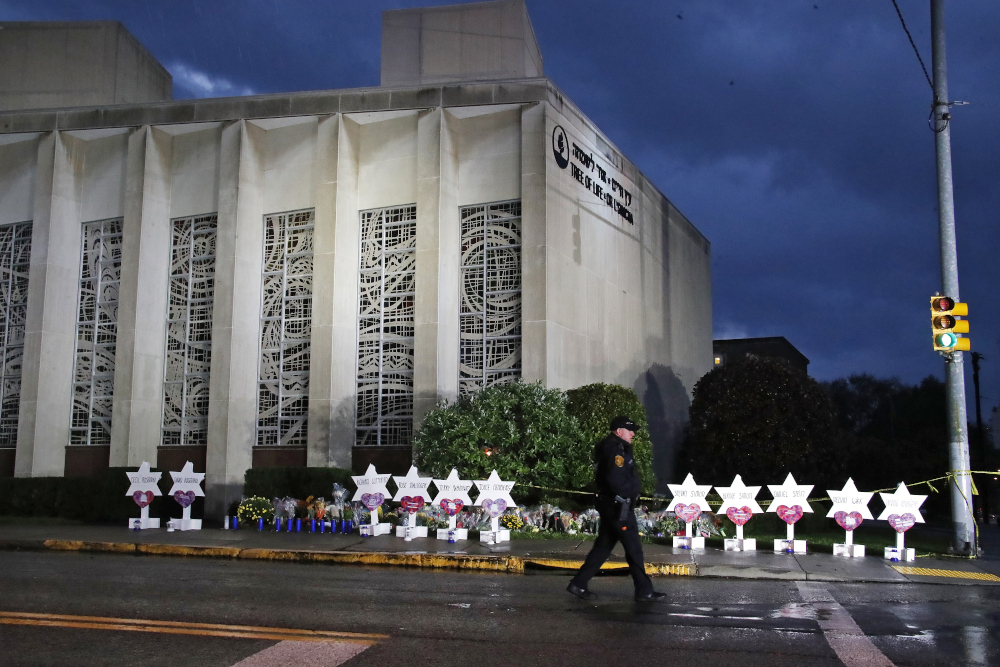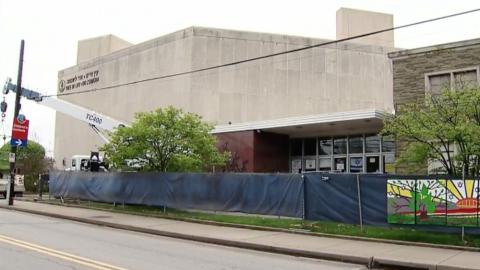
A Pittsburgh police officer patrols around the Tree of Life Synagogue and a memorial of flowers and Stars of David in Pittsburgh on Oct. 28, 2018, in remembrance of those killed and injured when a shooter opened fire during services at the synagogue. (RNS/AP/Gene J. Puskar)
Two of the three congregations that met inside the Tree of Life synagogue in Pittsburgh said they were saddened and disappointed with the news that federal prosecutors plan to seek the death penalty against a man accused of killing 11 Jews at their place of worship last year.
Leaders of both the New Light and Dor Hadash congregations had written to Attorney General William Barr to beg him not to pursue capital punishment for Robert Bowers. Four of the 11 people killed in the massacre, considered the deadliest attack on Jews in U.S. history, were members of those congregations.
But on Aug. 26, five federal lawyers filed a motion in the United States District Court for the Western District of Pennsylvania, saying Bowers’ alleged crimes justify a death penalty sentence. They cited five reasons, including Bowers’ lack of remorse, his religious animus toward Judaism and Jews and his substantial planning and premeditation.
Rabbi Jonathan Perlman of New Light Congregation vowed Tuesday to continue to fight the death penalty, which he believes is contrary to Jewish teachings. He also said it would re-traumatize the survivors of the Oct. 27 massacre.
Perlman said he thought prosecutors were trying to curry favor with the Jewish community by seeking the death penalty.
"But what the administration needs to understand is that if they took a poll of the Jewish community they would find out Jews are very much opposed to this for religious reasons," he said.
Congregation Dor Hadash posted a statement on its website saying it would have preferred a plea deal that would have allowed the gunman to serve a sentence of life in prison without parole.
A life sentence, the statement said, would have "honored the memory of Dor Hadash congregant Dr. Jerry Rabinowitz, who was firmly and unequivocally opposed to the death penalty."
Rabinowitz, 66, a beloved family physician, was killed in the shooting.
The third congregation meeting in the building issued a statement saying: "Tree of Life*Or L’Simcha does not have a statement on this matter; we have confidence that justice will be served."
Seven of the victims were from the Tree of Life congregation. The shuttered synagogue is in Pittsburgh’s historic Squirrel Hill neighborhood.
Advertisement
Jewish tradition has mostly, but not always, opposed the death penalty. In the United States, rabbis from nearly all non-Orthodox Jewish movements have issued formal resolutions against the death penalty.
That includes rabbis from the Reform and Conservative movements — the nation’s two largest Jewish denominations — as well as the smaller Reconstructionist Rabbinical Association, with which Congregation Dor Hadash is affiliated.
Perlman is also opposed to the death penalty for a more mundane reason. Had Bowers been offered a plea deal, he may have avoided a trial.

Fencing surrounds the Tree of Life Synagogue in Pittsburgh. (RNS/Video screenshot via KDKA)
Bowers pleaded not guilty to a 63-count indictment in U.S. District Court, but one of his lawyers had suggested he might have agreed to plead guilty if prosecutors dropped the death penalty.
Now, Perlman fears, people around the world will once again be subjected to Bowers’ documented stream of anti-Jewish invective and conspiracy theories, which Perlman believes would only serve to traumatize his congregants.
Bystanders said Bowers shouted anti-Semitic slurs during the attack, and he frequently reposted racist memes online.
"A drawn out and difficult death penalty trial would be a disaster with witnesses and attorneys dredging up horrifying drama and giving this killer the media attention he does not deserve," Perlman wrote to Barr earlier this month.
Perlman is himself a survivor of the attack; he hid in a storage closet during the shooting.
Some 30 rabbis backed Perlman’s letter. On Tuesday, Perlman said he has been in touch with the chief executive of the Conservative movement’s Rabbinical Assembly to see if it might also take a stand in this particular case.
Others have pointed out that the death penalty in this case was expected. The U.S. executed Timothy McVeigh in 2001 for blowing up the federal building in Oklahoma City in 1995. A jury recommended the death sentence for Dylann Roof, convicted of killing nine people at a historically black church in Charleston, South Carolina, in 2015.
Roof is now on death row in Terre Haute, Ind.
The attorney general has recently ordered the federal death penalty to be reinstated and has directed the Bureau of Prisons to schedule the execution of five death row inmates.
Perlman said he would continue to fight.
"I’m not giving up," he said in a phone interview. "I plan to lobby to get as many Jewish organizations as I can to write letters."







